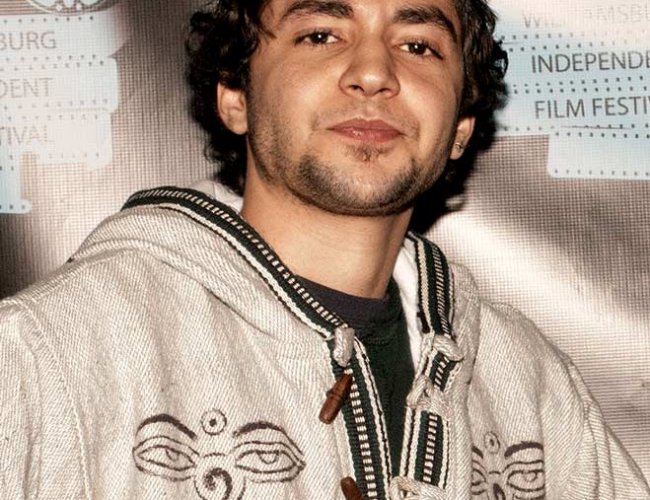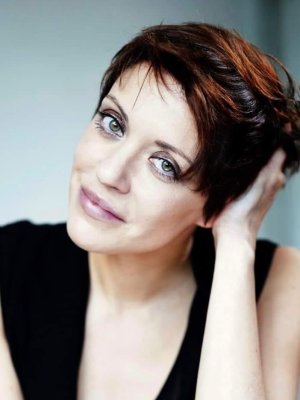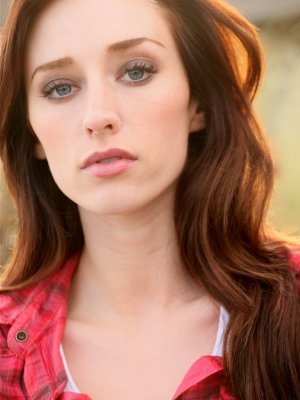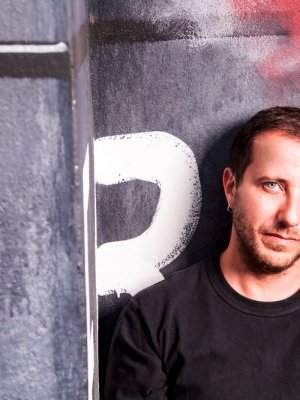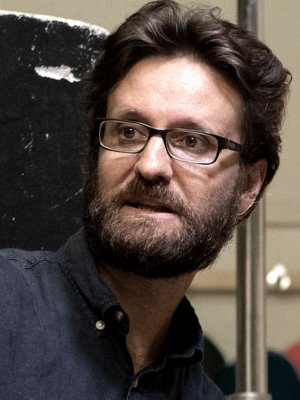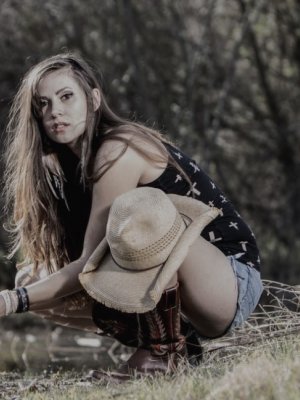David E. Munz-Maire introduces Chateau Sauvignon: Terroir
Horror Galore is really proud to introduce the great pure talent of David E. Munz‐Maire who's gonna talk with us about his successful short film: Chateau Sauvignon: terroir... so, hello David:
Q: Let's start with the movie… CHATEAU SAUVIGNON: terroir - want to tell us a little more about the story?
A: The concept was penned my final undergraduate semester at NYU as part of a feature writing class. I don’t recall exactly how the concept formed, but I remember having a very vivid image in my head of deep red blood splattering on green grapes. The feature script never fully formed though, and when I went back to school for my Masters degree a couple of years later, I decided to use the opportunity to explore the characters’ motivations and background story from the feature – why the vintners kill people, how they do it, et cetera – focusing on the point of view of the killers as opposed to the victims. We weren’t able to include the image of the blood on grapes because we shot in Spring (before the grapes grow), but it’ll most definitely be included in the feature.
Q: The most interesting thing I find in your short movie is the directing, how did you become such a great director?
A: That is very kind of you to say! Yet, there is no way I can take the credit for the performances, because every actor was phenomenal each day, and that’s more of a testament to their talent than it is to mine as a fledgling director. We didn’t rehearse that much either, both because I didn’t want the material to become stale, and because the casting process lasted so long that we had nearly run out of time. Instead, we focused primarily on stunts for safety purposes prior to the production getting under way. I was unbelievably lucky with Michael Lorz, as he opened up to me about darker times in his adolescence, and allowed me to rehash those feelings to prompt and trigger various reactions during filming. I feel unbelievably fortunate that he was comfortable enough with me to tell me those personal stories, and really, that’s what making a film is all about – trust. I definitely had that with Oliver Lucian Anderson, who is a remarkable cinematographer. We had worked together on several music videos and spec ads in the past, so we were familiar with each other’s ethos. We had discussed the look of the film, but he is really responsible for the final aesthetic. And I also had several producers on set whom I had full confidence would handle whatever production complications arose without having to burden me with them, just as I fully entrusted the rest of the team was on the same page, and knew what they were doing. This becomes especially crucial when production complications arise, as we are then able to roll with the punches rather than halt everything. Production is fluid, things come up which can seriously impede the final product, but you have to adapt, and trust that your crew is able to do so as well so that the final product doesn’t take a serious hit. Not having to micromanage on set unburdened me of an immense weight, and gave me the opportunity to focus on talking with the actors prior to each scene/ take to ensure they were comfortable, in the right mindset, and understood their motivation. It’s really a team effort, and the cast and crew are responsible for making me look good. Otherwise, I’d like to think that my addiction to binge watching content has rubbed off for the better.
Q: What is your connection with horror movies? Have you always been a horror maniac?
A: I don’t think I’ve always been a horror maniac, but I’ve had a close relationship with the macabre my entire life. My first foray into horror happened at a very young age. I was in first grade, at a friend’s house for a sleep over whose parents owned a massive collection of movies. We were no older than 6 and watching the original “Star Wars”, “Die Hard” and “Alien” films under his bed. But the villain that really terrified me was the mimetic poly-alloy T-1000 from “Terminator 2”. For weeks I would imagine him morphing out of my bedroom floor, so I would hold the sheets over my head until I’d fall asleep. But it wasn’t until my grandmother took me to see my first movie in a theatre -“The Nightmare before Christmas” at the Kent in Brooklyn – that I’ve had an attraction to the bizarre and morbid. I have a real passion for all things fantasy, and, to give you an idea, in high school, I would attend monthly larping events, and I hold several tabletop strategy game awards, including for chess and Warhammer. My enthusiasm for horror has gone hand in hand with my connection to fantasy my entire life. I love watching the ‘making of’ after a good fantasy or horror flic, particularly special FX heavy pictures; I watch these behind the scenes videos both to appease my curiosity, but also to comfort the boy holding the sheet over his head that whatever graphic scene was particularly uncomfortable to endure, it was simply an elaborately engineered skit. In my mind, if a movie can still make me feel uncomfortable after I watch how it was made, it has truly succeeded as a horror film. This fascination with how certain effects are achieved sparked an interest in pursing film as a career, and as an avid proponent of practical FX over visual FX, it only seems natural that a large part of why I enjoy making horror movies is because I get to play around with all the gnarly weapons and (usually) fake guts.
Q: Want to tell to our audience a little bit about your personal life story? This site have a section about real horror stories… did you ever experience something really creepy in your life?
A: My parent’s work for the World Health Organization, so I traveled a lot to 3rd world countries in my formative years. We lived in Phnom Penh, Cambodia, for a while when I was very young, around 1st grade, and our house was down the block from The Killing Fields Museum, dedicated to educating people on the atrocities the country faced during the Khmer Rouge’s communist regime. This holocaust museum includes walls of human skulls of genocide victims (intellectuals, politicians, disabled, etc), murals depicting soldiers bashing baby’s heads against tree trunks, photographs of prisoners being tortured with different tools, and the mass graves they were later discarded into. That stuck with me.
Q: The directing style of your film is much closer to cult movies than horror… and I love that. What’s your background David? Do you love essai-cinema?
A: Cult is exactly what we were going for! There isn’t a lot of comedic relief in the film, so we wanted the aesthetic to convey a sense of ‘fun’, which we were able to achieve with the zooms (a bit of a nod to 70s slashers) and rickety graphic match dissolve cuts. Despite my French background though, I have a bit of an aversion to the cahier du cinema films – they’re too experimental and didactic for my taste.
Q: Our audience want to know about your horror tastes… what’s your favorite horror movie and, if possible, your favorite director?
A: Ah yes, the ‘Sophie’s Choice’ question. I enjoy psychological thriller and horror movies about human monsters over paranormal or demonic forces. Knife to my throat, I’d have to say Michael Haneke’s “Funny Games”, for the simple fact that I’ve seen both the original German and American remake several dozen times, and it only gets better, like good wine! Haneke would probably be my favorite director, but I can’t get enough of David Cronenberg, George A. Romero, the Splat Pack (Eli Roth, Adam Green, Robert Rodriguez, etc) and of course New Wave French Horror directors (Gaspar Noe, Alexandre Aja, Catherine Breillat, etc).
Q: The photography of Chateau Sauvignon is really great; where did you take the inspiration for that?
A: The primary lighting reference I gave cinematographer Oliver Lucian Anderson was ‘chiaroscuro’, which refers to images that have one light source contrasting a dark scene. The visual examples that accompanied this were paintings from such classic 15th to 18th century Baroque painters as Raphael, Reubens, Caravaggio and Rembrandt. This was the best way I could have approached it, because, having seen him shoot several short form projects I produced prior to this film, I knew that Oliver truly paints with light, and witnessing him on set is consistently an immeasurable pleasure of working together. Additionally, I don’t work off storyboards as I find them too constrictive to what should be an organic medium. Rather, I create a shot list to ensure coverage, and then customize shots based on how the blocking evolves around our location during rehearsals. This allows me to stay creative, and keeps an open dialogue going between Oliver and myself; he is an artist as much as I am, and his insight is crucial to the process.
Q: I want to mention the great performance of the actors, especially Michael Lorz, the main character, he’s amazing… how did you find them?
A: My producer Carlos Valdivia had worked with Casting Director Adrienne Stern on a previous project of his, and brought her onboard to streamline the process. Locking the vintner father character and the visitor woman were relatively simple, as Sean Weil and Nancy Nagrant’s personalities and talent stood out distinctively from the crowd. Pooya Mohensi, who plays the sickly vintner matriarch, is a friend of several years, and the only talent I cast without auditioning as the film’s mater SFX artist Anthony Pepe recommended someone with high cheekbones and accentuated features for the vintner mother to pull off the various prosthetics.
Casting Nicolas and his victim Anthony was no simple feat, and this process lasted several weeks. Anthony del Negro originally auditioned for Nicolas, and was fantastic, but didn’t have the Victor van Dort vibe I wanted for the protagonist. I approached Anthony to broach the subject, and he was happy to be cast as the victim, but was definitely a bit disappointed as he rarely gets to play the role of the killer (check out the many Chiller Films he’s has death scenes in). Michael’s resume was fairly limited when we first met, and having just graduated school with a focus in theater, the only videos I could find of his work included him performing a sad clown routine and performing a risqué musical dance act. The casting of the film’s protagonist would be entirely based on our auditions. The casting process goes both ways, and we hit if off.
Q: Do you think horror movies are definitely your aim? How do you see your future?
A: For the foreseeable future, yes, I’m going to continue working on films that depict characters with abnormal psychologies, exploring the human monster, and the motivations that bend ‘normal’ people to the brink of what we consider socially acceptable behavior. Whether the genres of my films skew more heavily towards horror, thriller, drama or anything else will be largely determined by the story itself. Eventually I’d like to venture into more fantastical realms though, à la Peter Jackson or Guillermo del Toro.
Q: Share a dream with us. About your work or anything else.
A: A couple of years ago, while A.D.ing a short film shooting in Mumbai, India, I had a dream that I was a cowboy who had just landed in a small tumbleweed-strewn town. The barbershop was my first stop, and quickly becomes my last as the barber slit my throat soon after getting me on the seat. Then, he hands over my body to the butcher who turns me that day’s fresh cuts for the people of the famine-afflicted town. My rendition of “Chateau Sauvignon” as a Spaghetti Western, but heavily influenced by the Barber of Fleet Street; I wrote it down in the hopes of developing it into a larger story, so stay tuned!
thank you David for your amazing interview.
here's the link
to the Chateau Sauvignon: Terroir movie Homepage

